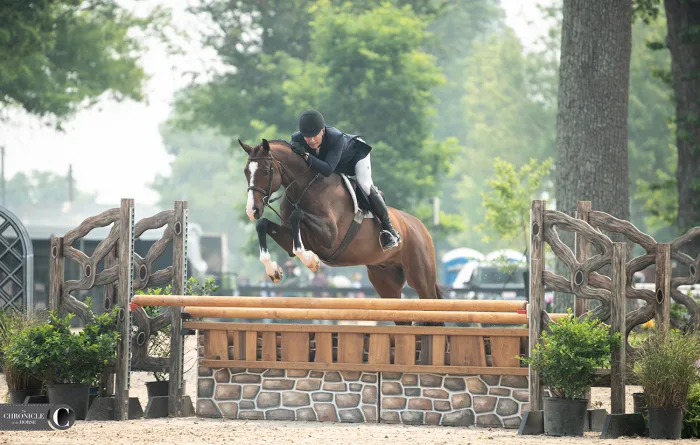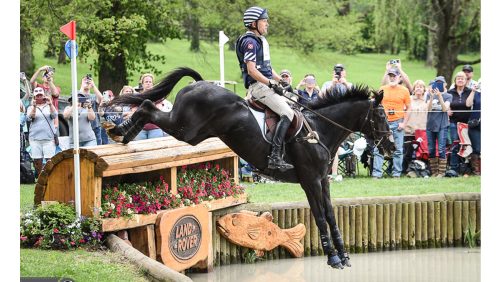Smoke from Canadian wildfires that have burned millions of acres of land has caused air quality issues in the central and northeastern U.S. severe enough to cancel Broadway shows in New York City and the country’s oldest horse show in Upperville, Virginia.
Organizers of the 170th Upperville Colt & Horse Show in Upperville, Virginia, announced around 10:30 a.m. Thursday that they were suspending the horse show “due to air quality concerns and the health and safety concerns of people and horses.” Shortly thereafter, with the air quality index for the area topping 200 and in the “very unhealthy” range, according to AirNow.gov, they decided to cancel showing for the remainder of the day.
“We monitored all morning, and when the air quality got to a point where we thought the particulate matter would be questionable for the health of the horses, we suspended classes til 12:30 p.m.,” show director Emily Day said. “We had meetings with the managers, the veterinarians and our medical director, and when our air quality had not changed—it actually had gotten worse by some measures—we decided to do the right thing by the horses, and to not take any chances or compromise their health in any way.”

The show’s management team will reassess air quality early Friday morning, but currently expects competition to resume then.
“We’ll spend [Thursday] afternoon trying to figure out rescheduling and what we can and can’t do,” Day said. “We have to do some reworking within the rules of the FEI and USEF, and also within the confines of the classes we have scheduled for the rest of the weekend. We’re doing our best. We’ve got a great team, and the team is absolutely putting safety of horses and riders first.”
The $50,000 Upperville American Standard Grand Prix, a $37,000 FEI power and speed class, local pony hunters and some of the amateur-owner hunters were among the classes canceled Thursday.
“It’s disappointing, but everybody has been great,” Day said. “There were no complaints at all.”
With a number of competitions scheduled for this weekend in smoke-affected areas—including not just Upperville, but the Middleburg Horse Trials in Virginia, Plantation Field Horse Trials in Pennsylvania and, across the border and closer to the wildfires themselves, the Mars Bromont CCI in Quebec—the U.S. Equestrian Federation released a statement Wednesday leaving decisions on whether to suspend or cancel shows up to organizers’ discretion but providing guidelines for making those decisions.
“In order to make the most informed decision, competition organizers must consult with state and local health authorities and government agencies and should frequently review the Environmental Protection Agency guidelines involving air quality at AirNow.gov to determine whether or not to operate their events,” the statement read. “Additionally, to best protect the health and safety of both equine and human competitors, the USEF strongly recommends that, in situations where the Air Quality Index (AQI) reaches 151 or above, an organizer consider suspending or cancelling competition.”
In Unionville, Pennsylvania, where Plantation Field is scheduled to run a one-day recognized horse trials Saturday and an unrecognized one-day on Sunday, organizer Bonnie Kibbie said the show is still on, but they are monitoring air quality carefully and will follow the USEF recommendations. On Wednesday the AQI was above 300 with a heavy haze in the area, but it had dropped to just below 200 on Thursday and was forecasted to keep improving to healthy levels by the start of competition.
ADVERTISEMENT
“Right now we’re scheduled as normal. The forecast looks like it’s supposed to be clear,” Kibbie said. “I’m treating it like any other weather pattern: We don’t make thunderstorm cancelations based on the forecast; we wait to see what the weather actually does. So on Saturday morning, if it’s fine, we’ll run. We’ll have to make that decision then, in conjunction with USEF guidelines.”
Max Corcoran, organizer of the Middleburg Horse Trials taking place this weekend at Great Meadow in The Plains, Virginia, said they’ve also been monitoring the situation.
“Right now obviously, if our competition was today, we would have to have a serious conversation about it, but the forecast at the moment—I’m looking at AirNow.gov—and the next few days are supposed to be getting better and better,” she said Thursday.
On Thursday, the AQI was solidly in the “very unhealthy” range in the area, however predictions indicate that by the start of competition on Saturday, it will return to “unhealthy for sensitive groups.”
“I’ve had a long chat with Chad Davis, who is our vet for the weekend and obviously lives here, and he’s from southern California and is way too familiar with all of this,” she said. “He’s going to put together a statement for us to send out to our competitors basically saying, if you or your horse has lung issues, please contact your vet and discuss this.”
As of now, organizers plan to leave the decision in the hands of the competitors, but Corcoran said if predictions are incorrect, they may alter the plan.
“Say the wind changes, because it could. If we get this in two days, we’ll probably back down to a combined test, and if it’s really bad we’ll just maybe do the dressage,” she said. “Everything’s already in place. Everything’s already been bought and been paid for. We have all the food, everything. That’s the hard thing with this, not really knowing. I think it’s worse for the people setting up [today] than it’s going to be for the competitors.”
In Quebec, where the Mars Bromont CCI begins with dressage today, weather conditions are good, despite the venue’s proximity to wildfires elsewhere in the province.
“Regarding the air quality here at the Bromont Olympic Equestrian Park, we are very lucky—our air quality index is below 10 [as of 9 a.m. EST],” Bromont’s Veterinary Delegate Dr. Yves Rossier, DVM, said in a statement. “The air currents are all blowing the smoke past us to the southern areas. The rain we had in the last 24 hours, and are continuing to have, has greatly settled the dust, contributing to very good air quality.”
The competition is progressing as scheduled, with dressage continuing Friday, cross-country Saturday and show jumping Sunday. Officials say they are closely monitoring the AQI to make sure horses and riders are not at risk.
ADVERTISEMENT
Colleen Duncan, DVM, Ph.D., is an associate professor of pathology at Colorado State University’s College of Veterinary Medicine and Biomedical Sciences who spoke to The Chronicle last fall for an article about the effects of climate change on horse sports. She has also been studying the effects of air quality on race horses and recently presented a paper showing that air quality, and particularly small particulate matter, is a statistically significant predictor of performance.
“I think this is a really great opportunity for people to learn more about air pollution and understand how to check it at the local level,” she said. “Knowing where to find your air quality information, how to interpret it, because the reality is there’s a lot of awareness during these huge, terrible smoke events. But there’s actually an awful lot of pollution that happens that people are not aware of, and they’re not taking action.”
For horse owners that are concerned, Duncan offers the reminder that horses are exposed to pollutants all the time, and she suggested focusing on what you can control. “Dust in your barn, dusty hay, all of those things that are within your control that we already know are irritants, [try to mitigate] all those things extremely well.”
It’s also important to know that the adverse effects from poor air quality linger after the air has improved. “The effects are not just in the immediate moment that the air is bad. One thing that people don’t consider is that with the small particulate matter, the damage is not restricted to the lungs; it actually gets absorbed into the bloodstream, and it goes around the body, and it becomes systemic,” she explained. “That’s a real problem because it basically upregulates inflammation. So it’s not just about the lungs. Know that it’s kind of a whole-body thing; that’s also really important. So again, anything else you can do that alleviates stress and supports your health and your horse’s health in general is important.”
After the immediate crisis has passed, Duncan suggests easing back into work while avoiding other stressors, such as heat.
For event organizers, and the associations that govern sport horse events, Duncan suggests that it will be important to have “mechanisms to ensure that competitions can be moved to healthier and safer days. And it’s not just the horses—there are people riding those horses, there are kids riding those horses. So I think if we think about that, for the health of everybody that’s really important,” she said.
Unfortunately this is an issue riders and event organizers can expect to be dealing with all summer, Duncan added—normally at this point in the fire season in Canada, about 10 to 15% of the expected total acreage of land would have burned. This year, the normal expected yearly total has already been consumed by flames, and it’s only June.
“So I think we need to create a system or we need to create a culture where we are prioritizing the health of the horse and the people under what is unfortunately going to become more common,” Duncan said.














